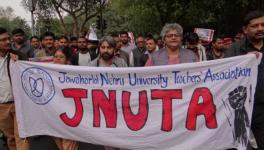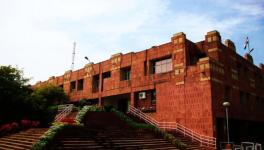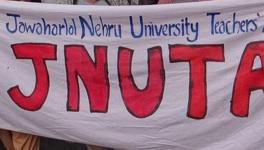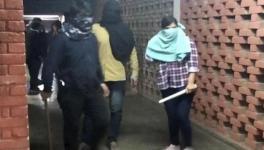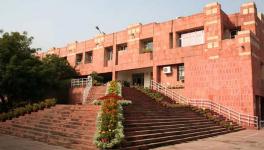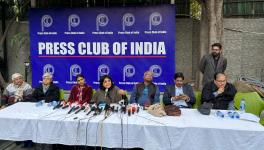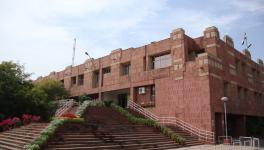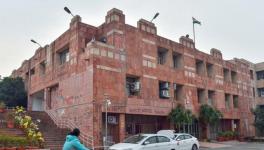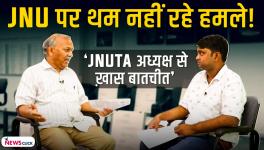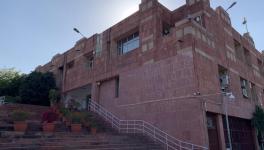Delhi: ‘SAU Crushing Academic Freedom by Suspending Teachers’
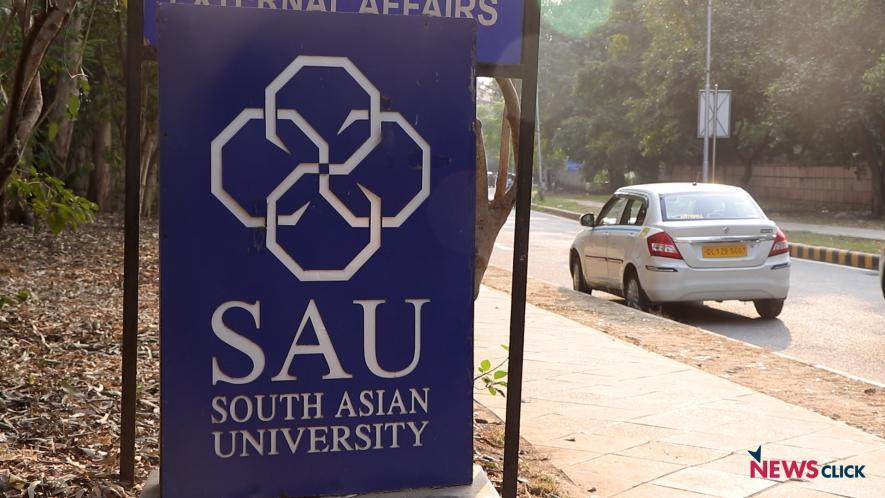
Teachers affiliated to different unions came together on Wednesday to denounce the suspension of teachers at South Asian University (SAU) in Delhi.
New Delhi: Teachers affiliated to different unions came together to denounce the suspension of teachers at South Asian University (SAU) and termed it “illegal and assault on academic freedom.”
Addressing a press conference at Press Club of India in New Delhi on Wednesday, teachers and members of civil society said that universities were turning into “garrison institutions” and SAU was the latest example.
South Asian University saw a protest over demand of increasing stipends and fellowships in November and December last year. The situation escalated when teachers wrote to the administration to register their protest over calling the police inside the campus to disperse the agitating students. Recently, some of those teachers were put under suspension over allegations of misconduct under regulation 17.8 and code of conduct.
Atul Sood, former President, Jawahar Lal Nehru University Teachers Association, pointed out that countries in South Asia has slipped in the rankings of the Academic Freedom Index and one of the indicators of curtailing freedom was action on dissenting teachers and students. “This is exactly what is happening in South Asian University where teachers are being punished for denouncing actions of administrators,” he added.
Sood said universities were meant to produce free thinking individuals who could base their decisions on reason and logic. “Here we have an administration which wants students and teachers to toe the line. This is not acceptable to us,” he added.
Ashutosh, Professor of Hindi at Delhi University, said democratic spaces in the South Asian territory were shrinking and universities were turning into “garrison institutions”.
“We used to hear about garrison states when our neighbourhood was discussed where one Supreme authority will decide everything. The examples set at South Asian University reminds us of garrison institutions where nobody can raise their voice and express their concerns. Association with any Marxist study circle is not illegal. Thus, it reeks of submission to a totalitarian authority,” he said.
D K Lobiyal, President, Jawaharlal Nehru University Teachers Association said that the teachers had sought time with president Ranjan Mohanty to discuss the issue but he declined any meeting. However, he was quick to reply that action was in accordance with bylaws of inter-governmental treaty. “When we looked for the bylaws on the website of the university, it was not available. However, we will be writing to the chairman of the governing body to highlight the plight of teachers and students,” he added.
In a joint statement, the teachers bodies said that the methods used by the students did not go beyond protest meetings, gheraos and an indefinite hunger strike – all of which are the usual forms of peaceful protest. The faculty members wrote and spoke to the administrative authorities, urging a different course of action that might reconcile students and win back their trust, have similarly acted well within democratic norms. “To selectively single out five students and four faculty members for disciplinary action – even as the protests were dying down after the move to the new campus – seems to be arbitrary and authoritarian, and sheerly a vindictive policy for a university administration. These measures are also in plain violation of SAU’s own rules and regulations,” the statement read.
In levelling these charges against the faculty, “those sitting in top administrative positions at the University have exhibited a regrettable lack of comprehension of a university’s function, the nature of the learning / teaching process, and the responsibilities of the students, teachers and administration at institutions of higher learning towards each other,” it added.
Condemnation of suspension of teachers also came from international scholars from Bangladesh and the US, who said that this chain of events demonstrated the “lack of transparency and accountability” prevalent in a leading higher education institution.
“Such despotic practices can only breed in an already non-democratic environment, and we, who have been observing recent political trends in South Asia and, in particular, India, find it no surprise that this has happened,” they said in a solidarity letter.
The letter added, “These actions show that these officials and administrators have no concern for academic practices or integrity, and neither research nor teaching is their priority. We condemn their actions, and we would like to bring the attention of SAARC to this issue.”
SAU Response
Reacting to the charges, Aheibam Prahalad, Public Relations Officer, South Asian University told NewsClick said that it never "suppressed the voice of teachers who criticised the administration for calling police inside the campus." SAU respects "the voice of teachers", including expressions of their differences of opinion on principles in seminars and other places where students are present.
When asked about the suspension of teachers and allegations of ”undermining academic freedom,” Prahalad said that "action is in line with" the SAARC Intergovernmental Agreement, Rules, Regulations and Bye Laws, including Regulation 17.8** on Professional Code of Conduct, the Bye Laws on Professional Code of Conduct for Faculty Members and Regulation 38.
Get the latest reports & analysis with people's perspective on Protests, movements & deep analytical videos, discussions of the current affairs in your Telegram app. Subscribe to NewsClick's Telegram channel & get Real-Time updates on stories, as they get published on our website.









